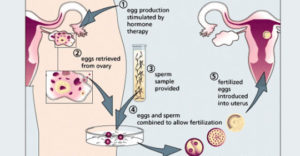How Have the Cases in Other States Been Coming Out? What are the Rules?
 Sofia Vergara, one of the most beautiful women in the world and one of the highest paid women in television[1] was engaged until 2014 to Nick Loeb, the son of a diplomat and philanthropist, great grand-nephew of former New York governor and banking heir Herbert H. Lehman, and cousin of the heir to the Seagram fortune, who admitted that even she thought he was a “dorky guy”.
Sofia Vergara, one of the most beautiful women in the world and one of the highest paid women in television[1] was engaged until 2014 to Nick Loeb, the son of a diplomat and philanthropist, great grand-nephew of former New York governor and banking heir Herbert H. Lehman, and cousin of the heir to the Seagram fortune, who admitted that even she thought he was a “dorky guy”.
 They wanted children but she wanted a surrogate to carry the pregnancy to term, so they went through IVF treatment. The first time, one implantation failed, and the surrogate miscarried. They went for a second egg retrieval, resulting in two female embryos,[2] which were cryogenically frozen. After they split up, he wanted the embryos to implant in a surrogate mother, which she refused to allow. Each time she had undergone IVF treatment, they both signed consent forms at the IVF facility which did not specifically say what would happen if they separated, which is required by California law,[3] but they did say that they would only be implanted if both of them agreed to it.
They wanted children but she wanted a surrogate to carry the pregnancy to term, so they went through IVF treatment. The first time, one implantation failed, and the surrogate miscarried. They went for a second egg retrieval, resulting in two female embryos,[2] which were cryogenically frozen. After they split up, he wanted the embryos to implant in a surrogate mother, which she refused to allow. Each time she had undergone IVF treatment, they both signed consent forms at the IVF facility which did not specifically say what would happen if they separated, which is required by California law,[3] but they did say that they would only be implanted if both of them agreed to it.
 Why Drag This Through the Courts?
Why Drag This Through the Courts?
Her lawyers say that Loeb is just trying to keep himself in the public eye, that he had always used her celebrity status to promote his hot dog condiment business[4], and that if he really wanted a family, he should hire a surrogate and an egg donor without unnecessary legal battles. He says that his position is not just about saving lives; it is also about being pro-parent. However, these cases are not really right to life cases, because the chance of successful implantation of viable frozen embryos is a subject of scientific debate, but from a 40 year old egg donor, probably somewhere in the range of around 30% to 40%[5]
Loeb’s Two Previous Girlfriends Who Had Abortions
 In the second case Loeb brought against Vergara in California, her lawyers asked to question two previous girlfriends who had aborted pregnancies fathered by Loeb, to try to show that his pro-parent beliefs were not as sincere as he claimed. Vergara won on this issue, and the California judge ordered Loeb to tell her the names of the two prior girlfriends, and also ruled that Vergara’s lawyers could question them under oath. Loeb publicly said he would go to jail before he revealed their names, and apparently abandoned the lawsuit rather so he would not have to obey the judge’s order.
In the second case Loeb brought against Vergara in California, her lawyers asked to question two previous girlfriends who had aborted pregnancies fathered by Loeb, to try to show that his pro-parent beliefs were not as sincere as he claimed. Vergara won on this issue, and the California judge ordered Loeb to tell her the names of the two prior girlfriends, and also ruled that Vergara’s lawyers could question them under oath. Loeb publicly said he would go to jail before he revealed their names, and apparently abandoned the lawsuit rather so he would not have to obey the judge’s order.
A woman is entitled to bring a pregnancy to term even if the man objects. Shouldn’t a man who is willing to take on all parental responsibilities be similarly entitled to bring his embryos to term even if the woman objects?
What are the Rules?
There is no federal law in this area, so it depends on what state you live in. Most courts will generally follow the directives on the forms the couple signed at the IVF center, however, the result might have been different if Loeb and Vergara had been married, because they lived in California, a community property state. Embryos clearly are viewed as property in New York, and in a New York case[6] very similar to this one, the wife was denied the right to thaw the embryos over the husband’s objection, based upon the form she had signed. Read More
Sofia Vergara Gets Cajun Justice
 Louisiana law, unlike any other state, has a specific law giving embryos rights as legal persons[9], and the judges will resolve any disputes between the “parents” about the embryo in the best interests of the embryo[10], in the same way that judges in all other states decide custody cases in the best interests of the child. For this reason, Loeb filed another lawsuit in the names of the embryos only, against Vergara in Lousiana state court, and Vergara transferred[11] the case to the federal court in Lousiana. “Diversity Jurisdiction” in federal court means that the lawsuit is between citizens of different states, and the amount in dispute is greater than $75,000. No federal judge can decide any case without first finding that there is federal jurisdiction, so to decide this, the judge had to decide if the embryos were citizens, even though they were created in a state that did not give them legal status. First, no one knows if embryos can be “citizens” for federal jurisdictional purposes, and no one, let alone a judge, has ever placed a dollar value on an embryo, so how could a judge possibly fix a value in a court case? The case also presented constitutional questions concerning procreation rights, and whether federal law “preempts” (takes precedence over) the Louisiana state laws giving rights to embryos from artificial insemination, because under Louisiana law embryos cannot be intentionally destroyed. The judge observed that all these difficult questions could be avoided by first deciding whether Sofia Vergara could be sued in the state of Louisiana at all in the first place. Any court, state or federal, needs some specific basis to make anyone answer and defend a lawsuit in any state where they don’t live or have a business[12]. This rule is called personal jurisdiction, and this is what gives the court legal power over anyone who is being sued. In this case, Sofia Vergara lived in California and had the IVF treatment which created the embryos there, she had never lived in Louisiana, she had only made a movie there and rented a house there for a few months. Even if she had, as Loeb claimed, had some conversations with him about the embryos there and that they had planned to live there in the future, that would not be enough to force her to defend any lawsuit in Louisiana. Read More
Louisiana law, unlike any other state, has a specific law giving embryos rights as legal persons[9], and the judges will resolve any disputes between the “parents” about the embryo in the best interests of the embryo[10], in the same way that judges in all other states decide custody cases in the best interests of the child. For this reason, Loeb filed another lawsuit in the names of the embryos only, against Vergara in Lousiana state court, and Vergara transferred[11] the case to the federal court in Lousiana. “Diversity Jurisdiction” in federal court means that the lawsuit is between citizens of different states, and the amount in dispute is greater than $75,000. No federal judge can decide any case without first finding that there is federal jurisdiction, so to decide this, the judge had to decide if the embryos were citizens, even though they were created in a state that did not give them legal status. First, no one knows if embryos can be “citizens” for federal jurisdictional purposes, and no one, let alone a judge, has ever placed a dollar value on an embryo, so how could a judge possibly fix a value in a court case? The case also presented constitutional questions concerning procreation rights, and whether federal law “preempts” (takes precedence over) the Louisiana state laws giving rights to embryos from artificial insemination, because under Louisiana law embryos cannot be intentionally destroyed. The judge observed that all these difficult questions could be avoided by first deciding whether Sofia Vergara could be sued in the state of Louisiana at all in the first place. Any court, state or federal, needs some specific basis to make anyone answer and defend a lawsuit in any state where they don’t live or have a business[12]. This rule is called personal jurisdiction, and this is what gives the court legal power over anyone who is being sued. In this case, Sofia Vergara lived in California and had the IVF treatment which created the embryos there, she had never lived in Louisiana, she had only made a movie there and rented a house there for a few months. Even if she had, as Loeb claimed, had some conversations with him about the embryos there and that they had planned to live there in the future, that would not be enough to force her to defend any lawsuit in Louisiana. Read More
How Have the Cases in Other States Been Coming Out?
At the end of the day, in almost all of the reported cases in the country, judges have honored the choices the couple made on the forms they signed at the in vitro facilities at the time, but the courts are very reluctant to make someone become a parent against their wishes. The Supreme Judicial Court of Massachusetts has said that even if the signed forms required one of the parties to become a parent against their will, this could not be enforced because it would be against public policy[14].Read More
The result might have been different in the Sofia Vergara case if Loeb had been able show that it was biologically impossible for him to father another child, but we will never know.
[1] Besides earning $325,000 per episode for “Modern Family”, she does extremely lucrative endorsements. A selfie posted on her social media account was used without her permission in an advertisement, which prompted a $15M lawsuit, alleging that this is what she normally gets for an endorsement. While the amount of the settlement against Venus Legacy in March, 2017 was confidential, it was certainly a respectable sum.
[2] “Embryo” is a technical misnomer in these cases. These are actually fertilized ovum, which are more accurately referred to as pre-embryos which can develop into embryos if successfully implanted in a female uterus.
